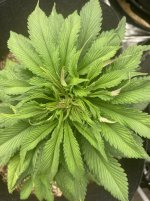I’m trying to identify what deficiency my plants are going through. To give a little back story I’m using recycled soil that after the first run was high in K and Mag. This developed into a lock out of calcium which was identified though a soil test. Before planting my current crop I amended the soil with Gypsum. Since then my plants have had stunted growth, clawing and yellowing between the veins. I’ve tried to just water with filtered water, but it seems that nothing has improved the situation. I was hoping to get some help as to what I can do to remedy the situation. Any help would be greatly appreciated.
-
Happy Birthday ICMag! Been 20 years since Gypsy Nirvana created the forum! We are celebrating with a 4/20 Giveaway and by launching a new Patreon tier called "420club". You can read more here.
-
Important notice: ICMag's T.O.U. has been updated. Please review it here. For your convenience, it is also available in the main forum menu, under 'Quick Links"!
You are using an out of date browser. It may not display this or other websites correctly.
You should upgrade or use an alternative browser.
You should upgrade or use an alternative browser.
Help with plant deficiencies.
- Thread starter jopium
- Start date
troutman
Seed Whore
One thing that helps a lot in determining plant issues is soil pH. If the pH is out of wack all kinds of problems happen.
High potassium levels does affect calcium. Coir or coco is rich in potassium and why growers who use that medium
need to use cal/mag. If the temps are too high or humidity to low problems also happen.
The other thing, I wouldn't have a fan that close to my plants.
I set my fan(s) to move air above the plants and below the lights.
My plants were initially suffering till I got cal/mag. Now they are nice.
LED lights are very bright and plants under them need extra nutrients from what I can see personally.
Good Luck
High potassium levels does affect calcium. Coir or coco is rich in potassium and why growers who use that medium
need to use cal/mag. If the temps are too high or humidity to low problems also happen.
The other thing, I wouldn't have a fan that close to my plants.
I set my fan(s) to move air above the plants and below the lights.
My plants were initially suffering till I got cal/mag. Now they are nice.
LED lights are very bright and plants under them need extra nutrients from what I can see personally.
Good Luck
[FONT=Arial, Helvetica, sans-serif]When you amended the soil with too much gypsum "calcium sulfate" you lost water efficiency and caused disturbances in ion balance. The nutrients in water can't link because of the blockage. Careful when adding any calcium to a mix because it's so easy to create water lock-out.  [/FONT]
[/FONT]
Thank you both for your feedback!
Troutman the reason I was apprehensive in using cal/mag was I didn’t want to lower the ph of the soil. I guess I ended up locking out key nutrients anyway.
Creeperpark I’ve never heard of a water lock-out before. Is there anything I can do now to correct the problem?
I have some epsom salt I was thinking of applying a foliar spray so I don’t further mess with the soil.
Troutman the reason I was apprehensive in using cal/mag was I didn’t want to lower the ph of the soil. I guess I ended up locking out key nutrients anyway.
Creeperpark I’ve never heard of a water lock-out before. Is there anything I can do now to correct the problem?
I have some epsom salt I was thinking of applying a foliar spray so I don’t further mess with the soil.
Do a pour through and catch some of run off and test it. If possible use distilled water for the best test accuracy. Don't put anything on the soil until you know what's in the leachate. 
Thank you both for your feedback!
Troutman the reason I was apprehensive in using cal/mag was I didn’t want to lower the ph of the soil. I guess I ended up locking out key nutrients anyway.
Creeperpark I’ve never heard of a water lock-out before. Is there anything I can do now to correct the problem?
I have some epsom salt I was thinking of applying a foliar spray so I don’t further mess with the soil.
Another term for water lock-out is osmotic shock. Osmotic shock, or osmotic stress is physiologic dysfunction caused by a sudden change in the solute concentration around a cell, which causes a rapid change in the movement of water across its cell membrane. Under conditions of high concentrations of either salts, substrates or any solute in the supernatant, water is drawn out of the cells through osmosis. This also inhibits the transport of substrates and cofactors into the cell thus “shocking” the cell. Lang KS, Lang PA, Bauer C, et al. (2005)
Alternatively, at low concentrations of solutes, water enters the cell in large amounts, causing it to swell and either burst or undergo apoptosis. Lang KS, Lang PA, Bauer C, et al. (2005) In other words, the water has to be buffered to keep the cells from bursting and bronzing. I think troutman made a good point, by using cal- mag as buffer instead of gypsum. 





